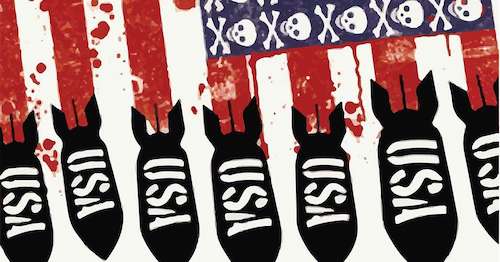There’s a phrase many people will utter when first meeting, first testing the waters of a potential friendship. In an attempt to keep conversation safe we’ll say, “you never want to mix politics and religion.”
Many of us have observed the affects of this when either of these two subjects are broached at family gatherings or even slightly touched on on social media. These two brought up together, mix religion and politics and you may have just started a war.
Rome, an empire built on violence and war, used the marriage of religion and politics often to control people much like we’ve seen all through out history. What an empire will often do is two part.
- First they will frighten citizens into obedience — they’ll create an enemy or prey on people’s fears. They’ll often take something and explode it— anything from fear of certain worldview or cultures to the measles outbreak. They’ll look like they are moving in the peoples best interest but slowly they will remove the people’s rights until it’s too late. We’ve seen this in movements like the “Deutsch Christian” movement headed by a man named Adolf Hitler. Notice that— Germany Christian. Because it’s not just a political issue, a movement gains the most steam when they can bridge politics and religion.
- After the masses have been severely riled up and a scapegoat has been chosen the masses will call for revenge and blood- they want those who are the enemies to be punished or removed.
The most terrifying element to this of course is that not only is it far from Christlike; it creates victims. Consider this; a Christian nation victimizing and marginalizing people? It would seem almost counter to the very message and messenger they pretend to follow.
In chapter 13 of Revelation John describes beastly empire by dividing it in two- politics and religion. John starts by describing a terrible beast from the sea- the political machine.
Revelation 13:1
This metaphorical beast comes out of the sea; again, metaphorical. For the ancients the sea was a mysterious place where evil was found. This beast steps onto land which essentially meant he’s laid ownership to it. This political power is described like a dragon but has a heightened desire to reign. And really this is a fantastic description of empires or countries drunk on power. It’s not enough to own half of the nation’s arms— we need more. It’s not enough to have political power we need more. Empries always need more.
Revelation 13:2
Next we see this beast is really just a patchwork of Daniel chapter 7’s beasts showing this beast is much like the other beastly empires. It conquers through force and oppression. It uses military might to conquer and claims manifest destiny – only we have a holy right to rule the world. Notice I write “holy”. Anytime a nation believes their rights are more important than other’s rights we have a problem. With that mindset it isn’t long before scapegoating follows. Jews are force vaccinated, concentrated and later murdered. We’ve seen this story before and unforgettably if things don’ change we’ll see it again.
This beast is actually the very opposite of Jesus description of kingdom
Jesus taught. Jesus’ kingdom come reality looked like:
- Rejects offers for position and high authority
- Rebuked the brothers when they asked who would sit with him in honor
- This beast is violent, Jesus orders Peter to put away the sword
- Jesus’ coronation as king happens not on a throne but a humiliating cross where recycling hate with love trumps eye for an eye mentality.
What’s interesting about empires and their history is that beastly empires always end up destroying themselves. Their lust for power and oppression of people cause the consequences of their actions to fall back on them. They get too big, too fat, and create too many enemies.
And that’s when an empire receives their fatal wound.
Revelation 13:3-4
John continues the metaphor and writes that this beast receives a fatal wound and yet is resurrected. What’s interesting about this is that almost every emperor after Nero had a similar story. Most emperors died in a bloody, politically charged way. They were always under the threat of a family member or someone assassinating them for title of the throne. Nero falls out of favor of the majority of his people and has to run. At the end he demanded his secretary kill him. Even though this was recorded, many people never actually saw the bodies and rumors floated all over the empire that Nero was still very much alive. With each new emperor that came after there were rumors that the new emperor was actually Nero in disguise. The common rumor was that “Nero had resurrected.” Also interesting to note that Domitian’s father Vespasian went into battle and received a fatal wound to the head yet miraculously survived! This was a popular story told all through out the empire.
While this is all pretty fascinating, the main point is that this beast, like Nero and the other emperors pretend to be gods. They claim they are gods who control ever death. This parody brings John’s people a brighter picture Jesus who’s message brings real life and real peace.
So the deep question of course for the people living during the Roman empire was; who is able to defeat this kind of beastly empire? Join me next week as I share John’s answer to this through the rest of chapter 13.
